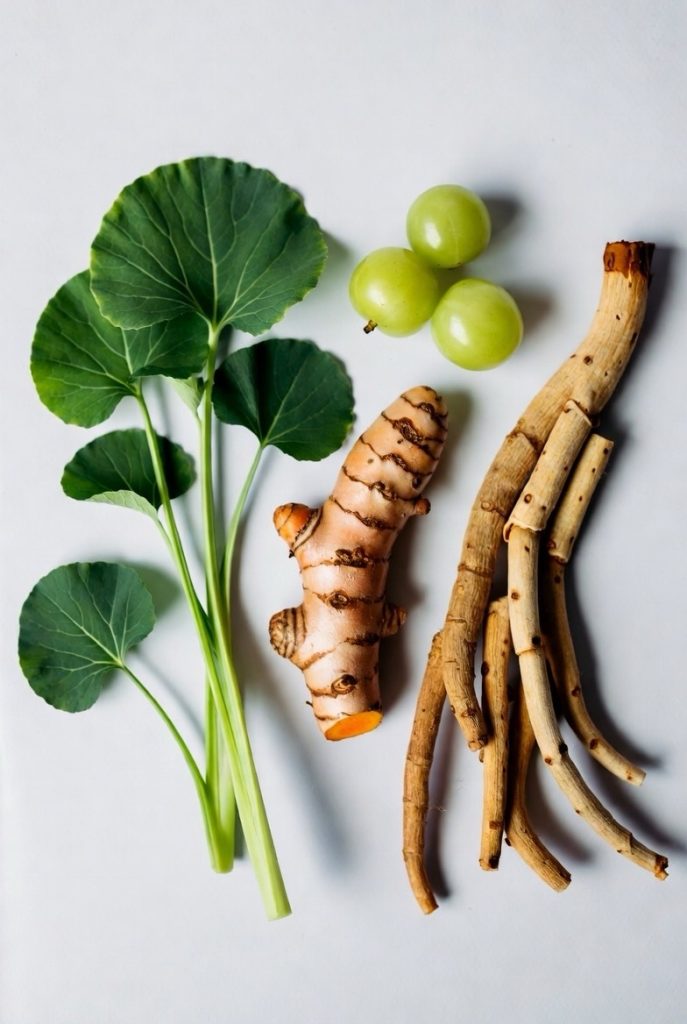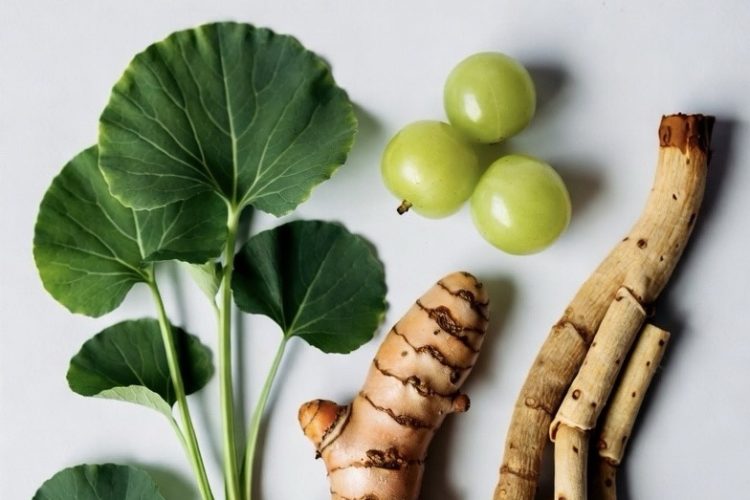Anti-aging herbs fight wrinkles, fine lines, and sagging skin by neutralizing free radicals, reducing inflammation, and boosting collagen. Top picks include turmeric (curcumin blocks UV damage and pigmentation), ashwagandha (lowers stress, improves elasticity), ginseng (stimulates cell renewal), gotu kola (firms skin, heals wounds), and amla (rich in vitamin C, brightens and hydrates). Others like holy basil, rosemary, ginger, aloe vera, and bakuchiol reduce oxidative stress, balance hormones, and protect against photoaging. Use topically in face packs, oils, or serums; take orally as teas or supplements. Combine with a healthy diet, sleep, and sun protection for best results. Start slowly and consult a doctor if needed. These natural remedies support radiant skin, energy, and long-term vitality.
Long Version
Top Anti-Aging Herbs: Natural Tips for Youthful Skin & Health
Aging is an inevitable process influenced by chronological aging and photoaging, where factors like oxidative stress, free radicals, and inflammation accelerate wrinkles, fine lines, and loss of skin elasticity. Anti-aging herbs offer natural remedies that combat these through antioxidants, collagen production enhancement, and inflammation reduction, promoting radiant skin, glowing skin, and overall vitality. These herbs, rich in bioactive compounds such as polyphenols, flavonoids, and phenolic compounds, support healthy aging by addressing internal balance and external stressors like UV damage and pigmentation. Drawing from traditional practices and modern research, this guide explores key herbs, their mechanisms, and practical applications for longevity, energy levels, stress reduction, and immune support, while delving deeper into synergistic uses and long-term strategies for optimal results.
Understanding the Mechanisms of Anti-Aging Herbs
Anti-aging herbs primarily work by neutralizing reactive oxygen species (ROS), which cause cellular regeneration disruptions and contribute to transepidermal water loss. Antioxidants in these herbs scavenge free radicals, reducing oxidative stress and microinflammation. They inhibit enzymes like metalloproteinases (MMPs), including MMP-1, collagenase, elastase, and hyaluronidase, which degrade collagen, elastin, and glycosaminoglycans essential for skin firmness and hydration. By promoting procollagen synthesis and fibroblast proliferation in keratinocytes, herbs enhance skin elasticity and wound healing while mitigating inflammatory responses via cytokines like TNF-α and IL-6.
Adaptogens among these herbs, such as those influencing hormesis and photoprotection, balance doshas (Kapha, Pitta, Vata) in Ayurvedic terms, fostering holistic benefits for cognitive function, mental clarity, joint health, cardiovascular health, and digestive health. Bioactive compounds like catechins, ginsenosides, glycyrrhizin, silymarin, arbutin, glabridin, liquiritin, aloesin, diosgenin, xanthorrhizol, raspberry ketone, gingerol, proanthocyanidins, ferulic acid, chlorogenic acid, apigenin, and hyaluronic acid further inhibit tyrosinase and melanogenesis, reducing dark spots and acne. Oral and topical use amplifies these effects, supporting detoxification and anti-elastase, anti-hyaluronidase, anti-collagenase activities for comprehensive anti-aging. Additionally, these mechanisms extend to broader systemic effects, such as regulating GABA for better sleep and stress management, which indirectly bolsters skin repair during restful periods.
Top Anti-Aging Herbs and Their Benefits
Ashwagandha
Ashwagandha, an adaptogen, excels in stress reduction and vitality enhancement. Its withanolides combat oxidative stress and inflammation, boosting collagen integrity and skin elasticity while reducing fine lines. It improves hydration and firmness, supporting immune support and energy levels. Use orally as tea or topically in face serums for youthful skin, and combine with yoga practices for amplified adaptogenic effects.
Turmeric
Turmeric’s curcumin provides potent anti-inflammatory and antioxidant effects, inhibiting MMPs and promoting collagen production to fade wrinkles, pigmentation, and dark spots. It addresses UV damage and photoaging, enhancing glowing skin and longevity. Apply as a face pack with honey or consume in golden milk for hepato-protective and anti-diabetic benefits, ideally paired with black pepper to boost curcumin absorption.
Ginseng
Ginseng, rich in ginsenosides, stimulates cellular regeneration and elastin production, reducing fine lines and improving skin firmness. It combats chronological aging by scavenging ROS and supporting cardiovascular health. As a nootropic, it aids cognitive function; use in teas or topical creams for vitality and wound healing, and consider Korean red ginseng varieties for stronger potency in energy restoration.
Gotu Kola
Gotu Kola boosts collagen synthesis and fibroblast proliferation, enhancing skin elasticity and reducing wrinkles. Its triterpenes like asiaticoside promote hydration and anti-hyaluronidase activity, ideal for acne reduction and pigmentation control. Consume as tea or apply in oils for joint health and mental clarity, and integrate into daily routines for sustained cognitive sharpness.
Holy Basil (Tulsi)
Holy Basil, an adaptogen, reduces oxidative stress and inflammation via eugenol and ursolic acid, supporting immune support and stress reduction. It improves skin radiance, elasticity, and detoxification, countering free radicals for longevity. Brew as tea or use in face oils for holistic benefits, and explore its role in balancing hormones during menopause for added anti-aging support.
Amla
Amla’s high vitamin C content stimulates procollagen and inhibits tyrosinase, reducing dark spots and enhancing hydration. Its polyphenols combat oxidative stress, promoting youthful skin and vitality. Eat fresh or apply in ubtan for immune support and anti-arthritic effects, and leverage its synergy with other vitamin C-rich foods for maximized antioxidant power.
Rosemary
Rosemary’s rosmarinic acid offers photoprotection and anti-collagenase activity, reducing wrinkles and improving circulation. It supports cognitive function and mitochondrial protection. Infuse in oils or teas for energy levels and anti-inflammatory responses, and use in scalp treatments to promote hair health as part of overall youthful appearance.
Ginger
Ginger’s gingerol inhibits inflammation and boosts collagen, fading fine lines and pigmentation. It aids digestive health and wound healing. Use in juices or topically for vitality and anti-diabetic properties, and combine with lemon for a detoxifying elixir that enhances internal cleansing.
Cinnamon
Cinnamon’s cinnamaldehyde scavenges free radicals, enhancing skin firmness and reducing acne. It supports cardiovascular health and blood sugar balance. Add to teas or masks for detoxification, and incorporate into baking for subtle daily intake without overwhelming flavors.
Aloe Vera
Aloe Vera’s aloesin and polysaccharides promote hydration, collagen production, and wound healing, reducing wrinkles and UV damage. Apply gel topically or consume for immune support, and chill the gel for a soothing, pore-tightening effect in skincare routines.
Calendula
Calendula’s flavonoids reduce inflammation and pigmentation, boosting elasticity and cellular regeneration. Use in creams for skin health, and infuse in carrier oils for custom balms targeting dry or irritated areas.
Neem
Neem’s nimbin inhibits melanogenesis and acne, supporting detoxification and immune health. Apply as oil or tea, and use diluted extracts to avoid irritation while maximizing antibacterial benefits.
Astragalus
Astragalus’s astragalosides activate telomerase, reducing cellular senescence and wrinkles while boosting immune support. Consume as tea for longevity, and pair with echinacea for enhanced seasonal protection.
Garlic
Garlic’s allicin scavenges ROS, enhancing collagen and cardiovascular health. Eat raw or in supplements, and crush cloves to activate compounds before consumption for peak efficacy.
Cayenne
Cayenne’s capsaicin improves circulation and reduces inflammation, supporting vitality. Use sparingly in foods, and apply topically in diluted forms for warming, circulation-boosting masks.
Cloves
Cloves’ eugenol offers antioxidant protection, reducing fine lines and pigmentation. Infuse in teas, and use ground forms in spice blends for consistent anti-inflammatory intake.
Sage
Sage’s plant estrogens balance hormones, reducing wrinkles and boosting elasticity. Drink as tea for anti-aging, and steep longer for stronger infusions targeting menopausal skin changes.
Bacopa
Bacopa’s bacosides enhance cognitive function and reduce oxidative stress. Use for mental clarity, and cycle usage to maintain effectiveness over time.
Shankhpushpi, Bhumyamalaki, Katuki, Comfrey, Chamomile, Guduchi, Bakuchi (Bakuchiol), Kumkumadi Tailam
These Ayurvedic herbs like Shankhpushpi for nootropic effects, Bhumyamalaki for hepato-protective benefits, Katuki for detoxification, Comfrey for wound healing, Chamomile for anti-inflammatory soothing, Guduchi for immune support, Bakuchi’s bakuchiol as a retinol alternative inhibiting MMPs, and Kumkumadi Tailam for radiant skin, collectively address pigmentation, firmness, and vitality through topical or oral use. Experiment with blends to target specific dosha imbalances for personalized results.
Additional compounds like resveratrol, catechins, and curcumin from sources such as grapes, green tea, and turmeric amplify these effects, creating powerful synergies when combined thoughtfully.
Natural Tips for Incorporation
For topical use, create face packs with turmeric, amla, and honey to reduce pigmentation and boost hydration. Apply aloe vera gel or rosemary-infused oils as face serums or Nalpamaradi Thailam for firmness. Oral intake via teas (holy basil, ginseng) or juices (ginger, carrot, beetroot with lemon and mint) supports internal balance, collagen production, and detoxification. Balance doshas with adaptogens like ashwagandha for Vata types. Essential oils from cloves or cayenne enhance serums for anti-elastase effects. For bay leaves, boil as toner to smooth wrinkles. Minerals like calcium, iron, phosphorus from herbs aid overall health. Combine with vitamins A, C, GABA for synergistic benefits, and track progress with a journal to refine routines based on skin responses.
To enhance longevity, integrate these herbs into a lifestyle that includes balanced nutrition, regular exercise, and adequate sleep, as these amplify herbal efficacy. For example, pairing anti-aging teas with meditation can further reduce stress-induced aging.
Precautions and Final Insights
Consult professionals before use, especially for allergies or conditions. Start low doses to avoid interactions. These herbs provide a natural, evidence-based path to youthful skin and health, emphasizing prevention through antioxidants and inflammation control for a vibrant, long life. Regular, consistent use yields the best outcomes, transforming daily habits into a foundation for sustained vitality and well-being.







